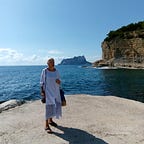Love From A Distance
I never saw my maternal grandparents together, or even both in the same country.
Born in England near the start of the last war, I loved my grandmother dearly and saw her often during my earliest years.
I heard her and my mother speak nostalgically of the castle in Czechoslovakia where they once lived and an image formed in my mind of a Walt Disney kind of place — maybe reminiscent of the fairy tale edifice in Snow White.
‘Nama’, as I called her, had been a dramatic actress since long before I was born. That was hard for me to imagine back then as I couldn’t yet process a world without me in it.
She was melodramatic — or so my father said, post-war, between her regular visits to us from her home for retired theatricals in London. He once added, memorably, that she could pluck a drama out of a hat.
I found that concept fascinating, just as I found Nama an endless source of fascination — especially once I discovered she had a husband who lived in Vienna.
Of course I questioned her about him, learning they’d met when he became infatuated with her as an actress, following her from Stage Door to Stage Door in London and elsewhere and ‘bombarding her’ with huge bouquets of roses.
Eventually, she said, he wore down her resistance and she married him — going to live in his family’s castle in Bohemia (which after the collapse of the Austria-Hungary empire in 1918 became part of Czechoslovakia).
This didn’t sound to me like love, on her part, and I said so after processing the information as best I could. Nama looked at me quizzically and said: “Well, he loved me, in his way.”
Of course I asked the obvious next question: “Who did you love then?”
I asked it more than once, via a variety of cunning guises, but Nama only ever smiled benignly, telling me in effect that she’d take her secrets to her grave.
Years passed before I heard my grandfather’s side of the story. I met him, in Vienna, for the first time when I travelled there with my mother, aged fourteen — and then again, for the last time, when I went to Vienna alone at eighteen.
He was poor in terms of income and possessions, his family’s heritage having been lost to the Nazis and then the Communists, but rich in terms of peace of mind.
We danced by moonlight aboard a boat on the Danube on my last evening with him and, as he held me in his arms, he told me: “This is strikingly similar to holding her. I’ve never stopped loving your grandmother. She’s always been, and always will be, the woman for me. Please tell her that — also that I understand.”
“Understand?” I prompted, wanting more.
“That she needed the theatre — plus, ideally, someone with more get-up-and-go than I ever had.” He smiled wistfully. “She maintained that I was disadvantaged by being born a rich man, because it made me so complacent and lazy. And I agree. Tell me, can you even imagine the two of us together, in the same country — your grandmother and me?”
“No,” I told him, “not honestly. She’s an actress, first and foremost, in life as well as on-stage. But it’s good that you both can find positives in how things turned out — and that you have shared memories.”
“Of life in the castle, you mean? Yes, indeed! A pity you never saw it.”
“Good, though, in a sense,” I said, “because I often see it in my imaginings, and that might be better than seeing the real thing.”
“It probably is,” he grinned, “given its ultimate fate, and as life could be quite volatile in the actual castle! Continue using your vivid imagination and looking for the good in life, my darling, and you’ll never go far astray.”
Those were almost the last words my grandfather spoke to me. He and Nama died within three months of each other a couple of years later.
But I’m still a fan of fairy tales!
So I wrote one, eventually, calling it The Foreigner.
You might be guessing that it’s about my grandparents — and it is about them, except that in my story they are imagined. Yes, the novel is pure fiction because I have few clues as to the actual happenings that brought them together and then separated them.
You see, my mother died all too soon after they did — long before I could ask her the questions I wish I’d asked.
So I simply took the tender thread of their lives that I’d detected and then built on it from my imaginings.
I took many liberties, for which I trust they’ll forgive me from where they are now. But I strongly felt their story, albeit a fictional version, needed telling.
Odd things happened, during my research and writing — very odd, some of them. It was almost as if I were being watched and even led in specific directions.
Certainly there came a moment when my characters took over and I then became simply the scribe, recording events as they evolved.
As Shakespeare said, through melancholy Jaques, in As You Like It: “All the world’s a stage and all the men and women merely players: they have their exits and their entrances; and one man in his time plays many parts, his acts being seven ages.”
I rest my case!
